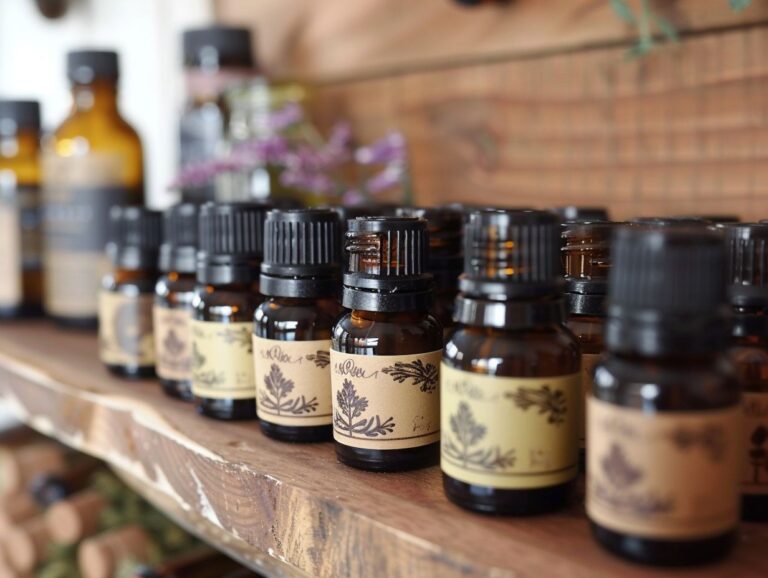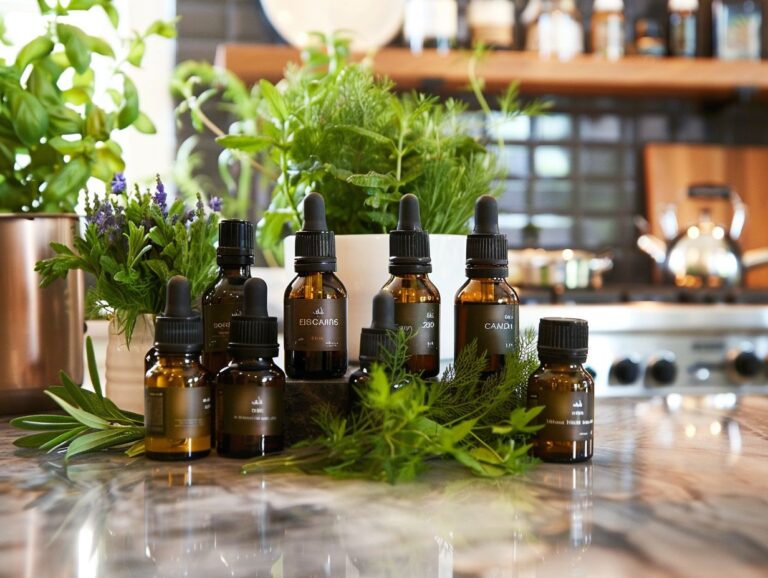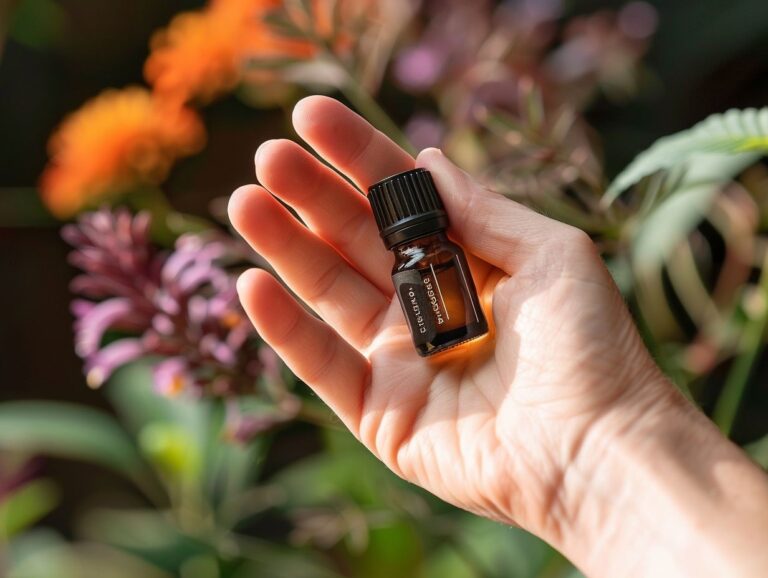Can I Mix Essential Oils With Vitamin E Oil
Curious about essential oils and vitamin E oil? In this article, we will explore the benefits of essential oils, such as aromatherapy, skin care, and stress relief, as well as the advantages of using vitamin E oil for moisturizing skin, promoting hair growth, and healing scars. We will also discuss whether essential oils can be safely mixed with vitamin E oil, with tips for proper dilution and allergy checking. Stay tuned to discover the best essential oils to combine with vitamin E oil for a holistic approach to health and wellness.
Key Takeaways:
What Are Essential Oils?
Essential oils are concentrated liquids extracted from plants that capture the plant’s scent and flavor or ‘essence’. These oils are often used in aromatherapy, skincare, and other applications for their various beneficial properties.
In terms of the extraction process, essential oils are typically obtained through methods like distillation, expression, or solvent extraction, ensuring that the purest form of the plant’s essence is preserved. These oils have a wide range of uses in everyday life, from promoting relaxation and stress relief in aromatherapy to enhancing skincare routines with their natural healing properties. Furthermore, essential oils are valued for their holistic wellness benefits, supporting both physical and emotional well-being through their natural therapeutic effects.
What Is Vitamin E Oil?
Vitamin E oil is a naturally derived oil rich in antioxidants that is widely recognized for its skincare benefits. It is commonly used in cosmetic and skincare products due to its moisturizing properties and protective effects against free radicals.
One of the primary sources of Vitamin E oil is vegetables, nuts, and seeds. When applied to the skin, it helps in improving skin texture, reducing inflammation, and supporting overall skin health.
The antioxidant properties of Vitamin E oil make it effective in neutralizing free radicals, thus protecting the skin from premature aging and damage caused by UV radiation.
Adding Vitamin E oil to your skincare routine can aid in hydrating and nourishing the skin, promoting a more youthful and glowing complexion.
What Are The Benefits Of Essential Oils?
The benefits of essential oils are vast and varied, ranging from aromatherapy to skincare applications. These oils are known for their ability to promote relaxation, improve skin health, and address various ailments naturally.
Essential oils play a significant role in stress relief, acting as natural remedies to reduce anxiety and promote a sense of calm. Many oils, such as lavender and chamomile, are renowned for their calming effects on both the mind and body.
Along with their therapeutic properties, essential oils are also used in skincare routines, offering a natural alternative to commercial products. Oils like tea tree and rosehip can help improve skin conditions such as acne and scars, thanks to their antibacterial and regenerative properties.
Aromatherapy
Aromatherapy is a holistic healing treatment that uses natural plant extracts to promote health and well-being. Essential oils play a key role in aromatherapy by utilizing the strength of plant-based scents to induce relaxation, improve mood, and alleviate stress.
These aromatic blends are derived from various parts of plants, such as flowers, leaves, bark, and roots, each offering unique therapeutic benefits. The practice of aromatherapy encompasses a range of applications including diffusers, massages, and inhalation therapies.
Diffusers are popular devices that disperse essential oils into the air, creating a calming ambiance and purifying the surroundings. Massages with essential oils not only relax the body but also promote skin health and improve blood circulation. Inhalation therapies involve breathing in the aromatic vapors of essential oils, which can have a direct impact on the respiratory system and emotional well-being.
Skin Care
Essential oils are renowned for their skincare benefits, offering natural solutions for various skin conditions. These oils possess moisturizing, antioxidant, and anti-inflammatory properties that can help maintain healthy and radiant skin.
One of the key advantages of using essential oils in skincare routines is their ability to deeply moisturize the skin, leaving it soft and hydrated. Jojoba oil, for example, is excellent for locking in moisture and maintaining skin suppleness. The antioxidant properties found in essential oils help combat free radicals, which can contribute to premature aging of the skin.
For individuals dealing with acne, essential oils like tea tree oil and lavender oil can be beneficial due to their antibacterial and anti-inflammatory properties, which can help reduce redness and inflammation associated with acne breakouts. Similarly, for those with dry skin, oils such as rosehip seed oil and argan oil provide intense hydration, helping to nourish and restore the skin’s natural barrier.
Relieves Stress and Anxiety
Essential oils are widely used to alleviate stress and anxiety, offering natural remedies for relaxation and emotional well-being. These oils can be diffused, inhaled, or applied topically to promote calmness and peace of mind.
One of the key aspects that make essential oils effective in managing stress and anxiety is their ability to interact with the limbic system in the brain, which is responsible for emotions and memories. When lavender oil is inhaled, for example, it can signal the brain to release chemicals that induce relaxation and reduce feelings of tension.
Along with their calming effects, certain essential oils, such as bergamot and ylang-ylang, possess mood-enhancing properties that can uplift spirits and promote a sense of well-being. These oils can be diffused throughout a room or added to a warm bath to create a soothing atmosphere conducive to relaxation.
For topical application, diluting essential oils with a carrier oil, such as jojoba or coconut oil, is recommended to prevent skin irritation. Chamomile oil and sandalwood oil are popular choices for massage or body oils, as they can help ease muscle tension and soothe both the body and mind.
What Are The Benefits Of Vitamin E Oil?

One of the key advantages of incorporating Vitamin E oil into your skincare regimen is its ability to strengthen the skin barrier, preventing moisture loss and promoting smooth, hydrated skin.
Its anti-inflammatory properties can help soothe irritated skin, making it an excellent option for those with sensitive or eczema-prone skin.
Regular use of Vitamin E oil can also aid in diminishing the appearance of fine lines and wrinkles, providing a more youthful and radiant complexion.
Moisturizes Skin
Vitamin E oil is a highly effective moisturizer that helps nourish and hydrate the skin, leaving it soft, supple, and radiant. Its emollient properties make it ideal for combating dry skin and maintaining optimal skin health.
One of the key benefits of vitamin E oil is its ability to lock in moisture, providing a protective barrier that prevents dehydration and promotes skin elasticity. This makes it a popular ingredient in various skincare products such as lotions, creams, and serums. When applied topically, vitamin E oil helps to soothe and hydrate the skin, reducing the appearance of fine lines and wrinkles.
Promotes Hair Growth
Vitamin E oil can stimulate hair growth by improving blood circulation to the scalp, nourishing hair follicles, and strengthening hair strands. Regular application of vitamin E oil can help promote healthier, thicker hair growth.
Along with its direct effects on hair growth, vitamin E oil also plays a crucial role in maintaining scalp health. A healthy scalp is the foundation for strong, vibrant hair. By moisturizing the scalp and preventing free radical damage, vitamin E oil supports the environment needed for optimal hair growth.
The nourishing properties of vitamin E oil help revitalize hair follicles. When applied regularly, it can enhance the circulation of blood to the follicles, ensuring that essential nutrients reach the hair roots, promoting their growth and overall health.
Helps with Scars and Wounds
Vitamin E oil is known for its ability to help diminish scars and wounds by promoting skin regeneration and repair. Its antioxidant properties aid in reducing hyperpigmentation, scarring, and promoting the healing of damaged skin tissues.
When applied topically, vitamin E oil penetrates deep into the skin, nourishing and moisturizing the affected area. This can help improve the texture and appearance of scars over time. Vitamin E oil has anti-inflammatory properties that can calm irritated skin and reduce redness. It is often used in skincare products for its ability to protect the skin from environmental stressors and UV damage. Regular use of vitamin E oil can contribute to overall skin health and promote faster wound healing.
Can Essential Oils Be Mixed With Vitamin E Oil?
Yes, essential oils can be mixed with vitamin E oil, but it is essential to follow proper dilution and safety guidelines to avoid skin irritation or adverse reactions. Combining essential oils with vitamin E oil can enhance their benefits and create synergistic blends for skincare and personal care applications.
When blending essential oils with vitamin E oil, it is crucial to ensure that the concentrations are appropriate to prevent any potential skin sensitivities or reactions. Proper dilution ratios need to be adhered to, typically ranging from 0.5% to 3% for topical application, depending on the specific essential oils used.
Incorporating essential oils with coconut oil can further aid in dilution and enhance the absorption of the essential oils into the skin, promoting efficacy.
As with any essential oil formulation, conducting a patch test on a small area of skin before widespread use is recommended to check for any adverse reactions.
Yes, But With Caution
Mixing essential oils with vitamin E oil can yield potent skincare blends, but caution must be exercised to ensure proper dilution ratios and sensitivity testing. Always perform a patch test before widespread use to check for any adverse reactions.
Essential oils are highly concentrated extracts from plants that can offer numerous benefits to the skin and overall well-being. When mixed with vitamin E oil, these blends can provide nourishment, hydration, and even help with various skin concerns.
Due to their potent nature, essential oils should never be used undiluted on the skin, and vitamin E oil, although beneficial, does not dilute essential oils. This is where the importance of proper dilution ratios comes in to avoid skin irritation or adverse reactions.
Incorporating a sensitivity test by applying a diluted mixture on a small area of skin is crucial to assess any possible allergic reactions or sensitivities before broader application. This step is particularly significant when combining different essential oils or using them on sensitive skin types.
Check for Allergies
Before blending essential oils with vitamin E oil, it is crucial to check for allergies and conduct a sensitivity test on a small patch of skin. This precaution ensures that the oils are well-tolerated by the skin and do not cause any adverse reactions.
Often, individuals may not realize they have sensitivities to certain essential oils or vitamin E oil, making these precautionary steps essential in avoiding potential skin irritations or allergic responses.
- These tests help identify any underlying conditions that could be aggravated by the oils, ensuring a safe application method.
- When performing an allergy check, carefully observe the skin for any redness, itching, or inflammation, as these may indicate an adverse reaction.
- By taking these proactive measures, one can enjoy the benefits of essential oils and vitamin E oil without compromising skin health or comfort.
Dilute Properly

Proper dilution is crucial when blending essential oils with vitamin E oil to ensure safe and effective use. Following recommended dilution ratios and guidelines from experts like Robert Tisserand can help create well-balanced and skin-friendly oil blends.
Essential oils are highly concentrated plant extracts, and their potency can cause skin irritation or sensitization if not properly diluted. Dilution ratios are essential to strike the right balance between the therapeutic benefits of the oils and minimizing the risk of adverse reactions. For instance, a common dilution ratio for topical application is 2% essential oil to carrier oil. It is crucial to consider individual sensitivities, age, and health conditions when determining the appropriate dilution ratio.
What Are The Best Essential Oils To Mix With Vitamin E Oil?
When mixing essential oils with vitamin E oil, some of the best choices include Lavender Oil, Tea Tree Oil, Peppermint Oil, Rosemary Oil, and Eucalyptus Oil. These essential oils complement the benefits of vitamin E oil and offer a range of skincare and aromatherapy advantages.
Further enhancing the properties of vitamin E oil, Lavender Oil stands out for its calming and soothing effects on the skin, making it ideal for promoting relaxation and alleviating stress. Tea Tree Oil brings antiseptic and antibacterial properties, helping with combatting acne and promoting overall skin health. Peppermint Oil brings a refreshing and cooling sensation, perfect for uplifting mood and providing relief from headaches.
- Rosemary Oil is renowned for its stimulating and clarifying properties, aiding in improving focus and memory while promoting circulation.
- Eucalyptus Oil, with its invigorating aroma, is great for respiratory support and purifying the air, making it an excellent choice for diffusing.
Lavender Oil
Lavender oil is a versatile essential oil that pairs beautifully with vitamin E oil for its soothing, calming, and skin-nourishing properties. When combined, Lavender Oil and vitamin E oil create a harmonious blend that promotes relaxation and skin rejuvenation.
Not only does this blend offer a calming effect on the mind and body, but it also has remarkable benefits for skincare. Lavender oil is known for its antibacterial and anti-inflammatory properties, making it ideal for treating acne, soothing skin irritations, and reducing redness. When mixed with vitamin E oil, this powerful duo can help hydrate and nourish your skin, leaving it soft and supple.
The aromatic qualities of Lavender Oil can enhance your overall well-being by reducing stress, anxiety, and promoting better sleep. Whether used in a diffuser, added to bath water, or applied topically, this essential oil combination can uplift your mood and create a tranquil environment.
Tea Tree Oil
Tea Tree Oil is a powerful essential oil that, when combined with vitamin E oil, offers potent antiseptic, anti-inflammatory, and acne-fighting properties. This blend is ideal for addressing blemishes, skin irritations, and promoting clear, healthy skin.
Through its antibacterial effects, Tea Tree Oil helps combat acne-causing bacteria, reducing breakouts and preventing new blemishes. Vitamin E oil, with its skin-clearing benefits, nourishes and hydrates the skin, promoting healing and rejuvenation. Together, these oils create a dynamic duo that not only treats existing acne but also helps prevent future flare-ups. The therapeutic properties of this blend extend beyond acne treatment, soothing skin conditions like eczema and psoriasis, and providing overall skin health.
Peppermint Oil
Peppermint Oil is a refreshing essential oil that pairs well with vitamin E oil for its cooling, invigorating, and skin-revitalizing qualities. When combined, Peppermint Oil and vitamin E oil create a stimulating blend that energizes the senses and rejuvenates the skin.
The cooling effects of Peppermint Oil are particularly beneficial for soothing minor skin irritations, such as itching or redness. Its aromatic properties not only uplift the mood but also help alleviate headaches and nausea. In skincare, Peppermint Oil’s antibacterial and anti-inflammatory properties can assist in combating acne and promoting a clear complexion. The invigorating scent of Peppermint Oil makes it a popular choice in aromatherapy for promoting mental clarity and focus.
Rosemary Oil
Rosemary Oil is a versatile essential oil that complements vitamin E oil with its antioxidant, circulation-boosting, and hair-strengthening properties. When blended, Rosemary Oil and vitamin E oil create a stimulating concoction ideal for scalp health and hair growth.
One of the key benefits of using this combination is the hair care benefits they offer. Rosemary Oil is known for its ability to promote hair growth and thickness, while vitamin E oil nourishes and strengthens the hair follicles. Together, they can help combat issues like hair loss and breakage.
Along with enhancing hair health, this blend is also excellent for scalp nourishment. Rosemary Oil has antimicrobial properties that can help keep the scalp clean and healthy, while vitamin E oil moisturizes and soothes any dryness or irritation.
The therapeutic effects of these oils can provide a calming and rejuvenating experience during massage or application. The refreshing scent of Rosemary Oil adds to the relaxation, making it a pleasant and beneficial addition to your hair care routine.
Eucalyptus Oil
Eucalyptus Oil is a invigorating essential oil that pairs harmoniously with vitamin E oil for its respiratory-clearing, immune-boosting, and skin-revitalizing properties.
The blend of Eucalyptus Oil and vitamin E oil offers a refreshing and rejuvenating experience for both the body and mind. When inhaled, Eucalyptus Oil can help clear congested airways, making it beneficial for those dealing with respiratory issues such as colds or allergies. The immune-boosting properties of Eucalyptus Oil can support overall wellness, helping the body fight off infections and illnesses.
Not only is Eucalyptus Oil beneficial for the respiratory system and immune health, but it also has remarkable skincare advantages. When mixed with vitamin E oil, it can promote skin cell regeneration, aiding in the healing of wounds and soothing skin irritations. The antiseptic properties of Eucalyptus Oil further contribute to its skincare benefits by helping to cleanse the skin and prevent breakouts.
Frequently Asked Questions
Can I mix essential oils with vitamin E oil?
Yes, you can mix essential oils with vitamin E oil. In fact, combining these two ingredients can provide additional benefits to your skin and hair.
What are the benefits of mixing essential oils with vitamin E oil?
The combination of essential oils and vitamin E oil can help improve skin elasticity, reduce inflammation, and nourish the skin and hair. It can also act as an antioxidant, protecting the skin from free radicals.
Which essential oils can I mix with vitamin E oil?
You can mix any essential oil with vitamin E oil, but some popular options include lavender, tea tree, rosehip, and frankincense. It’s important to properly dilute the essential oils and do a patch test before using them on your skin.
How do I mix essential oils with vitamin E oil?
To mix essential oils with vitamin E oil, you can add a few drops of your chosen essential oil to a small amount of vitamin E oil and mix well. You can then use this mixture directly on your skin or add it to your skincare or haircare products.
Can I mix essential oils with vitamin E oil for internal use?
No, it is not recommended to ingest essential oils, even when mixed with vitamin E oil. Essential oils are highly concentrated and can be harmful if taken internally. Stick to using them topically or aromatically.
Are there any precautions I should take when mixing essential oils with vitamin E oil?
Yes, it’s important to properly dilute essential oils and do a patch test before using them on your skin. Some essential oils may cause irritation or allergic reactions in some individuals. It’s also best to store the mixture in a cool, dark place to prevent the oils from breaking down.









2 Comments